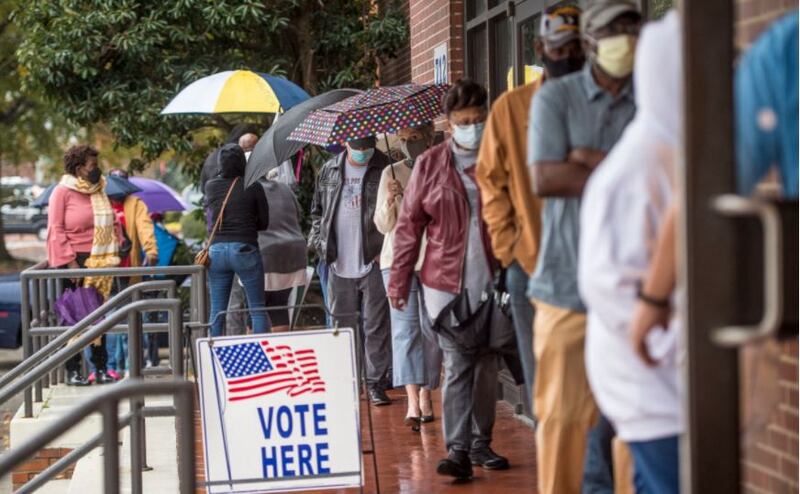ATLANTA — Gov. Brian Kemp has signed a controversial bill that will impact how you will be able to vote in the future.
SB 202 passed along party lines Thursday in the state Senate and went to the governor’s desk shortly after.
Among highlights, the law requires a photo ID in order to vote absentee by mail, after more than 1.3 million Georgia voters used that option during the COVID-19 pandemic.
“After the November election last year, I knew like so many of you that significant reforms to our state elections were needed,” Kemp said in a news conference after he signed the bill. “When voting in person in the state of Georgia, you must have a photo ID. It only makes sense for the same standard to apply to absentee ballots as well.”
I was proud to sign S.B. 202 to ensure elections in Georgia are secure, fair, and accessible. I appreciate the hard work of members of the General Assembly to make it easy to vote and hard to cheat. pic.twitter.com/1ztPnfD6rd
— Governor Brian P. Kemp (@GovKemp) March 25, 2021
Democratic Senate Minority Leader Gloria Butler said the bill was filled with “voter suppression tactics.”
“We are witnessing right now a massive and unabashed assault on voting rights unlike anything we’ve seen since the Jim Crow era,” Butler added.
Republican Rep. Jan Jones said the provisions cutting the time people have to request an absentee ballot are meant to “increase the likelihood of a voter’s vote being cast successfully,” after concerns were raised in 2020 about mail ballots not being received by counties in time to be counted.
RELATED STORIES:
- Georgia House passes sweeping voting bill, advances to Senate
- New version of voting bill passes out of committee, adds back Sunday early voting
- Gov. Kemp talks controversial voting bills, effort to repeal citizen’s arrest law
One of the biggest changes gives the GOP-controlled legislature more control over election administration, a change that has raised concerns among voting rights groups that it could lead to greater partisan influence.
The law replaces the elected secretary of state as the chair of the state election board with a new appointee of the legislature after Republican Secretary of State Brad Raffensperger rebuffed former President Donald Trump’s attempts to overturn Georgia’s election results. It also allows the board to remove and replace county election officials deemed to be underperforming.
Republican Rep. Barry Fleming, a driving force in crafting the law, said that provision would only be a “temporary fix, so to speak, that ends and the control is turned back over to the locals after the problems are resolved.”
The law also reduces the timeframe in which runoff elections are held, including the amount of early voting for runoffs. And it bars outside groups from handing out food or water to people standing in line to vote within 150 feet of a polling place.
About 50 protesters including representatives from the NAACP gathered across from the Capitol building Thursday in opposition.
State Rep. Park Cannon was also arrested Thursday night for banging on the Gov. Kemp’s door while he was holding a news conference about the bill’s passage.
Channel 2 Action News was there as members of the Georgia State Patrol removed Cannon from the Capitol.
Georgia state representative Park Cannon was arrested and taken to the Fulton County jail tonight after allegedly interrupting Governor Kemp’s speech at the Capitol. She’s now facing two felony charges. @wsbtv pic.twitter.com/e0y5z8VlTZ
— Justin Wilfon (@JustinWilfonWSB) March 26, 2021
Cannon was taken to the Fulton County Jail. Cannon was charged with obstruction of law enforcement and preventing or disrupting General Assembly sessions or other meetings of members.
Shortly after Kemp signed the bill, former Georgia gubernatorial candidate and Fair Fight founder Stacey Abrams tweeted: “It’s Jim Crow in a suit + tie: cutting off access, adding restrictions, encouraging more ‘show me your papers’ actions to challenge a citizen’s right to vote.”
Rep. Nikema Williams called the law, “the most flagrantly racist, partisan power grab of elections in modern Georgia history – and a slap in the face to Georgia’s civil rights legacy.”
House Speaker David Ralston called the bill fair.
“I think it’s a very fair bill, and I know those who choose to monetize this issue will continue to pound the drums of division and discord, but I think the process worked,” Ralston said.
The law does not contain some of the more contentious proposals floated by Republicans earlier in the session, including limits on early voting on Sundays, a popular day for Black churchgoers to vote in “souls to the polls” events. It instead mandates two Saturdays of early voting ahead of general elections, when only one had been mandatory, and leaves two Sundays as optional.
The Associated Press contributed to this article.
Cox Media Group







